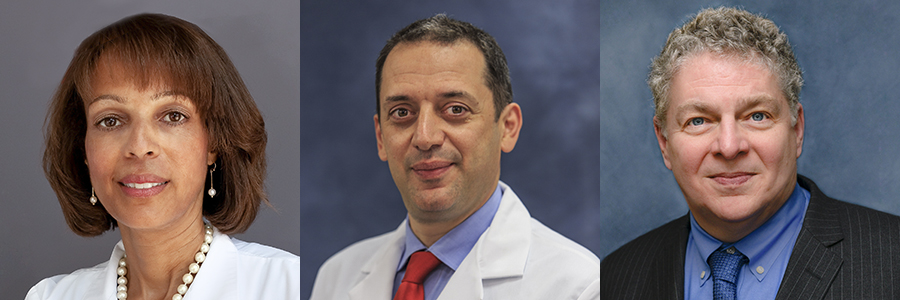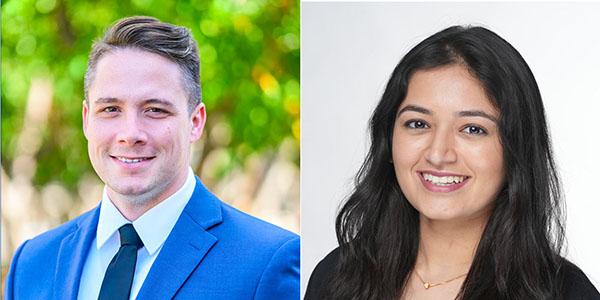
Expanded program is meeting a growing need
The Emory Department of Ophthalmology is proud to announce that its newly expanded Optometry Residency Program has accepted two optometrists for the 2024-25 academic year.
Mark Eaves -- a soon-to-be graduate of Kentucky College of Optometry -- and Krima Shah - - a graduating optometry student from Nova Southeastern University - will each join the Emory Eye Center as post-graduate optometry residents beginning in July of 2024.
Established in 2023, Emory’s one-year Optometry Residency Program originally offered just one opening. Based on the success of its inaugural resident, Aysha Shafi, OD, the program expanded to two slots in 2024.
The Optometry Residency Program at Emory is designed to give optometry school graduates advanced training in ocular diseases, with an emphasis on cornea and contact lens. The year-long program focuses on the anterior segment of the eye. Residents are mentored by practicing Emory faculty to develop clinical expertise in medical contact lens fitting/management as well as in the assessment and management of complex ocular diseases.
Find out more about applying to the Emory Optometry Residency.
“We had almost 20 applications for these two openings, which is incredible for such a new optometry residency program,” said Susan Primo, OD, MPH, FAAO, the director of the Emory Optometry Residency program.
Primo said the number and the quality of the 2024 applicants were a testament to the expertise and reputation of Boris Severinsky, OD, FAAO, FBCLA, FSLS, the residency supervisor for cornea and contact lens.
"With the increasing prevalence of myyopia and other anterior segment conditions, the demand for clinicians who can visually rehabilitate a patient through use of therapeutic contact lenses is on rise. Boris is internationally respected for his work in this area."
Dr. Allen Beck, the F. Phinizy Calhoun, Sr. Chair of Ophthalmology echoed Primo's sentiments, adding:
“Graduates of traditional optometry schools gain valuable clinical experience working with experts like Boris Severinsky. Particularly in contact lens. Not every optometrist has the expertise to fit their patients with them, but the demand for them is very strong.“

Meet the 2024-25 Optometry Residents
Mark Eaves
The 37-year-old optometry resident is coming to Emory by way of the oil and gas industries, where he worked for 11 years as an analyst. He understands when his career path elicits a chuckle, but he is unmistakably serious about optometry.
"I'd always thought I would become a doctor when I was younger. In college, I was a pre-med major for three years, but I changed majors. I didn't know exactly what field [of medicine] I should pursue," he said.
After graduating, he took a job that surprisingly launched a career.
For awhile, anyway.
"I am a numbers person. I liked analyzing contracts and markets so I did really well as an analyst. I made a lot of money - for myself and the companies I worked for. But when I analyzed what I was doing and why I was doing it, I couldn't see myself doing it for the next 30 years. Making money is great, but it's not everything."
Meanwhile, a routine visit to an optometrist gave him more to ponder. In addition to dilating Eaves's eyes, the optometrist got him talking about his still-vibrant interest in medicine. Those conversations became a bit of an ear-worm for the former pre-med major.
"So at 32, I started taking a few physics classes that I needed to get into optometry school," he said.
The decision to pursue a residency after four years of optometry school was, again, the product of analysis.
”Throughout my education and clinical rotations, I developed a strong interest in ocular disease, cornea, and specialty contact lens fitting. With a residency, I know I will get exposed to more complex situations and more in-depth consultations - things that will increase my value as an optometrist."
Krima Shah
For Tampa, Florida native Krima Shah, the path to Emory’s Optometry Residency was a little more direct. After majoring in cell and molecular biology at the University of South Florida, she knew she wanted to pursue optometry. The optometry degree at Nova Southeastern that she will finish up this spring brought her that much closer to her goal.
She wanted more.
"We learn all that we can about optometry by reading books and attending lectures, but in real life nothing presents the way it does in a textbook," she said. "I wanted to feel more comfortable as a clinician, evaluating patients and treating them. And the best way to do that is by working with experienced clinicians. I knew I would get that in a residency program."
Shah chose the Emory Optometry Residency Program because it focused on two areas that fascinated her.
"Most optometry residency programs will focus on disease or on contact lenses, but I wanted to study both," she said. "And I will gain a lot of perspective on the healthcare field by completing my residency in a setting that includes a hospital. Emory offered all of these things."
-Kathleen E. Moore

